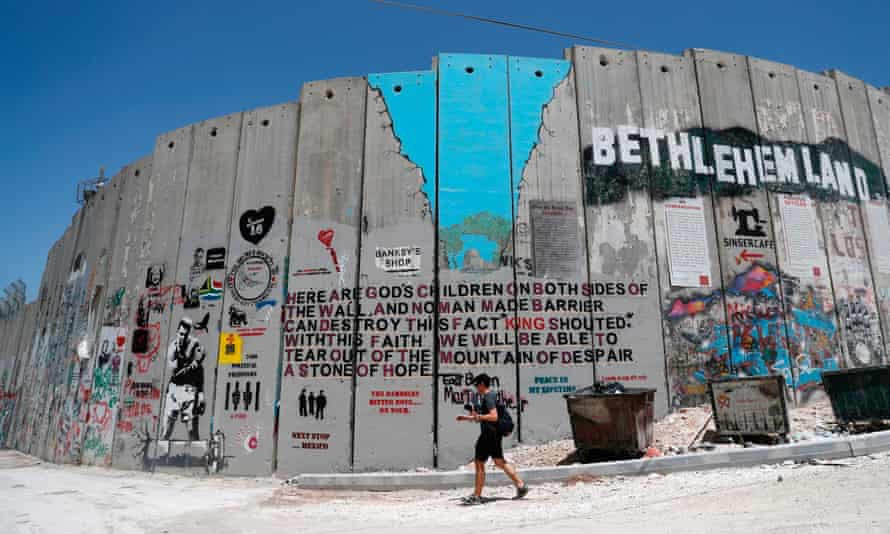The government has warned schools to ensure a balanced presentation of opposing views on the conflict between Israel and Palestine, which claimed more than 250 lives last month and sparked a wave of classroom protests in the UK. But teachers may struggle to comply because the only exam board to offer curriculum material and a GCSE history option on the region has withdrawn its two textbooks after being accused of favouring the case for Israel.
It is the second time that the history books, published by Pearson, the education company that owns the Edexcel exam board, have been taken off the shelves. The first time – in October 2019 – was because Jewish organisations claimed the books favoured Palestine. Pearson undertook to make revisions suggested by the Board of Deputies of British Jews and UK Lawyers for Israel, but the revised editions caused a storm of protests and complaints, this time from the British Committee for the Universities of Palestine (Bricup).
The retention of the study option is seen as vital by historians who worry that only a tiny number of schools now teach about the conflict. Just 1,100 students in 27 schools, of which 26 are in England, have chosen it for this year, out of 148,678 taking history GCSE with the board and an age cohort of 600,000.
The loss of the textbooks increases the risk that the Middle East will disappear from the curriculum, says Michael Davies, a former history teacher and founder of Parallel Histories, an organisation that provides material for students to understand conflicts from different sides. “Teachers don’t want to teach it and not because it’s not interesting, but because they are scared about being accused of bias. The other exam boards had already departed the scene and so Pearson, although getting pilloried over changes to the books, are the good guys here,” he says.
The row is over the textbooks Conflict in the Middle East c1945-1995 for GCSE, published in 2016, and its IGCSE partner, The Middle East: Conflict, Crisis and Change 1917-2012, published in 2017. In 2019, the Zionist Federation launched an online petition for their removal and Pearson commissioned Parallel Histories to examine their accuracy. Davies says its report suggested some changes in terminology but found “no overall bias”.
However, the Board of Deputies of British Jews and UK Lawyers for Israel continued to protest, saying the books were “seriously biased against Israel”. The books were taken off the shelves while they engaged with Pearson over changes, especially cases where they felt a disputed viewpoint had been adopted without qualification. The UK Lawyers for Israel objected, for example, to the book’s description of the Deir Yassin massacre in 1948 as “one of the worst atrocities of the war” and the omission of the “massive improvement” in the living standards of Palestinians on the West Bank and Gaza Strip under Israeli rule.

The revised books were reissued briefly in 2020, but they have now been withdrawn following complaints from Bricup, which worked with John Chalcraft, a professor of Middle East history and politics at the London School of Economics, and James Dickins, a professor of Arabic at the University of Leeds, to compare the revised version of the books with the originals. The professors produced a report listing 294 revisions to the original books and say the vast majority are changes that favour the Israeli point of view.
“The revisions have consistently underplayed and explained Jewish and Israeli violence, while amplifying and leaving unexplained Arab and Palestinian violence,” the report concludes. “They have extended or left intact accounts of Jewish and Israeli suffering, while downplaying and editing accounts of Arab and Palestinian suffering.”
It is very important that this subject is taught, says Prof Chalcraft. “It is so clearly linked to the present and it’s vital to educate people through balanced material.”
Parallel Histories provides a scheme of work used by 200 schools, among them Huddersfield grammar school, which gets students to debate the conflict from both sides, increasing their oracy skills along the way.
Thomas Poulter-Dunford, its head of history, says there is value in tackling controversial subjects. “It opens students’ minds to see different perspectives, and also ensures they critically engage with evidence. I think it is also fundamental in confronting common misconceptions, in an era of misinformation.” He had used the original version of the disputed Pearson textbook with GCSE groups. “I didn’t notice anything majorly wrong with the wording, however, I do understand that certain words may come across differently to the two sides.”

Chalcraft says that while the original version “reasonably describes Jewish settlers as those who live in new settlements built on the West Bank and Gaza”, the revised version defines them as Jews returned to villages from which they were expelled in 1948, among others. “This definition is a nonsense in regards to the overwhelming majority of Jewish settlers who were not expelled in 1948,” he says. “In the original book there is a photo of children wading through sewage in Gaza and in the new version it just says “children in Gaza”.
Jonathan Turner, the chief executive of UK Lawyers for Israel, says Pearson did not accept all its suggestions but thinks the latest version of the books is less biased. The original definition of “Jewish settlers” was inaccurate, he says, because a significant number went to places that had previously been Jewish communities. “On the picture caption, we asked Pearson whether there was any evidence that the puddle of water shown in the photograph was sewage since it looked quite clear, with reflections of the children. Pearson responded by removing the reference to sewage,” he says.
“The authors of the Bricup report and Bricup itself are biased against Israel and promote a boycott of all Israeli universities.”
Chalcraft and Dickins both say they took great pains to be rigorous and unbiased when they reviewed the books. Chalcraft says: “I am a credible researcher and educator on the issue of Israel and Palestine and well qualified to comment on their history.”
Marie van der Zyl, the president of the Board of Deputies of British Jews, says: “We are proud of work we undertook with Pearson to address serious concerns of bias in the two textbooks, including a lack of contextualisation and omissions of peace efforts and of the suffering caused by this conflict to all involved.”
Pearson says it has “paused” distribution of the books while it reviews them once more. “We will gather a wider range of views and we will take action if there is more work to do to get that balance right,” said a spokesperson. In the meantime schools could use its topic guide, she said. “We would be happy to make a pdf of the guide available to any customer who wants it.”
Stay connected with us on social media platform for instant update click here to join our Twitter, & Facebook
We are now on Telegram. Click here to join our channel (@TechiUpdate) and stay updated with the latest Technology headlines.
For all the latest Education News Click Here
For the latest news and updates, follow us on Google News.
